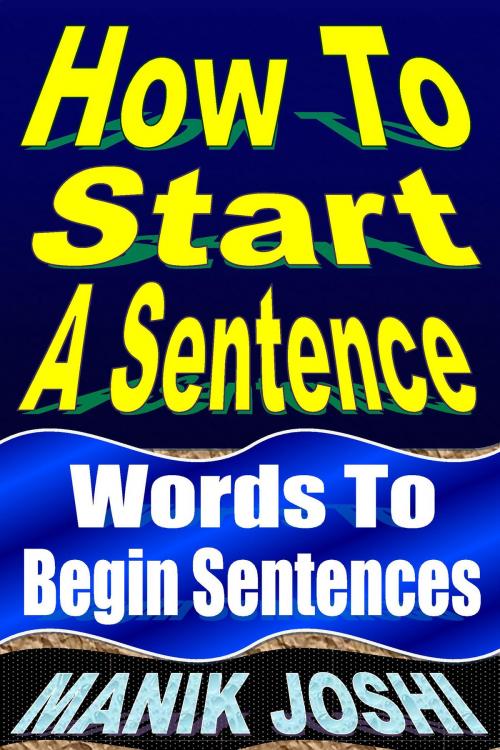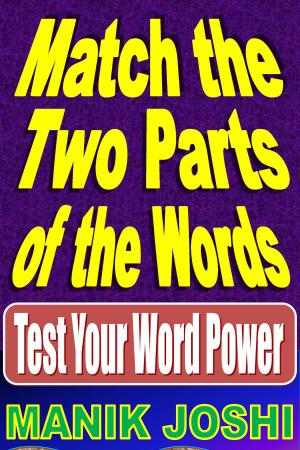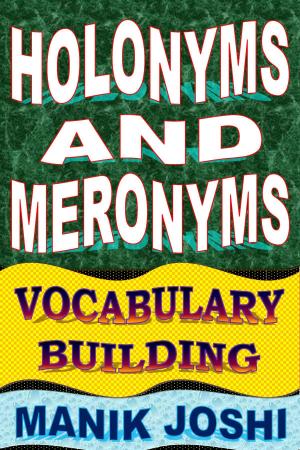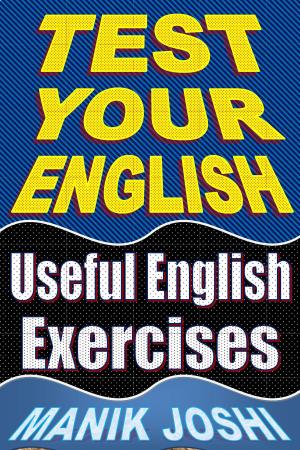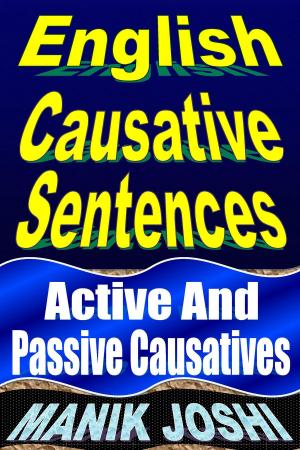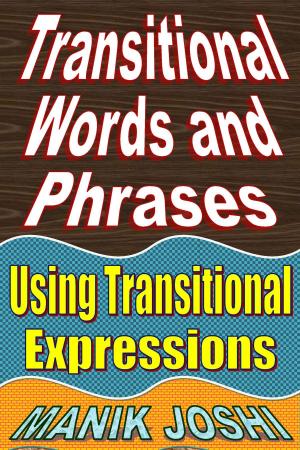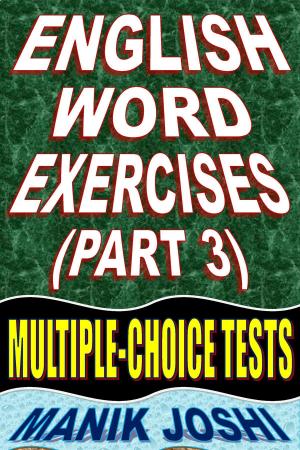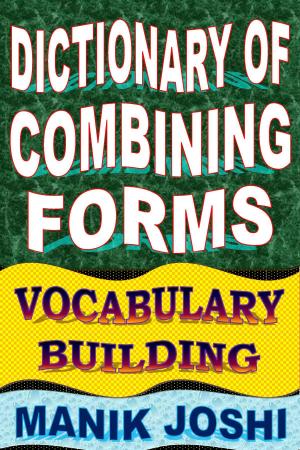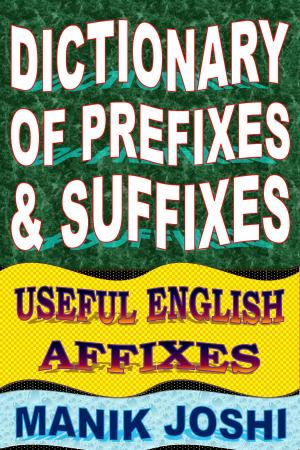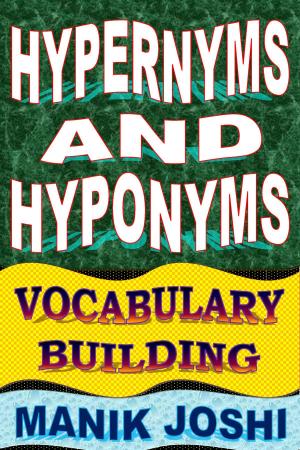How to Start a Sentence: Words to Begin Sentences
Nonfiction, Reference & Language, Study Aids, ESL, Health & Well Being, Self Help, Self Improvement, Self-Esteem, Foreign Languages| Author: | Manik Joshi | ISBN: | 9781301268917 |
| Publisher: | Manik Joshi | Publication: | February 8, 2013 |
| Imprint: | Smashwords Edition | Language: | English |
| Author: | Manik Joshi |
| ISBN: | 9781301268917 |
| Publisher: | Manik Joshi |
| Publication: | February 8, 2013 |
| Imprint: | Smashwords Edition |
| Language: | English |
This Book Covers The Following Topics:
How to Start a Sentence
Start a Sentence -- Using ‘AS’
Start a Sentence -- Using ‘AFTER’ and ‘BEFORE’
Start a Sentence -- Using ‘BY’
Start a Sentence -- Using ‘FOR/FROM
Start a Sentence -- Using ‘IF’
Start a Sentence -- Using ‘OF/ON/OUT’
Start a Sentence -- Using ‘TO’
Start a Sentence -- Using ‘IN’
Start a Sentence -- Using ‘WITH’
Start a Sentence -- Using ‘QUESTION WORDS’
Start a Sentence -- Using ‘ING’ FORM of VERBS
Start a Sentence -- Using ‘PAST PARTICIPLES’
Start a Sentence -- Using ‘-LY Words’
Start a Sentence -- Using ‘PRONOUNS’
Start a Sentence – Miscellaneous
Exercises: 1(A) and 1(B)
Exercises: 2(A) and 2(B)
Sample This:
There are different ways to start a sentence in English. Using pronoun (I, we, you, they, he, she, it) is the most popular way to begin a sentence. But there are many other words which are widely used to start a sentence. They might be question words (what, where, etc.). They might be words formed from verbs, ending in –ing, -ed, -en, etc. Besides, words such as ‘to’ ‘in’ ‘with’, ‘if’, ‘after’ are also used to begin a sentence.
Here, you will learn various words and phrases to start a sentence with.
Important Note:
Starting a sentence with ‘and’ or ‘but’ is correct or not!
Using ‘And’ or ‘But’ to begin a sentence is generally considered grammatically Incorrect. But there is no hard and fast rule in this regard. So, you can use ‘And’ or ‘But’ to begin a sentence. But avoid excessive use of these words to begin a sentence. Use these words in the beginning of a sentence only when they really give strength to your language.
Note: It is said that a sentence should not be begun with a conjunction of any kind, especially one of the FANBOYS (for, and, nor, but, or, yet, so). But this is not hard and fast rule. Particularly in spoken English, starting a sentence with ‘And’ or ‘But’ is common.
How to start a sentence -- Using ‘AS’
As a matter of fact no notice was given to anyone.
As a policeman myself, I am aware of all the laws.
As against last time four days, the fair will last for five days this year.
As always, he won the match.
As an interim arrangement, we directed the authorities not to return the land.
As fate would have it, he crossed the international border.
As for David, he is doing fine.
As he got busy, she picked up his son.
As he grew older, he developed his communications skills.
As if the bad power situation in the city wasn’t enough, the hike in power tariff has come as the last straw for residents.
As in the past, party president distanced herself from the government’s unpopular decision.
As long as here is violence by unruly mobs, use of police force is inevitable.
As often happened, he forgot to send me reply.
As part of the deal, they will hand-over control of five west bank towns.
As penance, he vowed to never scold any kid ever again.
As per his version, nobody had got injured in the incident.
As per rules, the same bill should be passed by the two Houses of the Parliament before it is sent to the President for his signature and promulgation for implementation.
As sanitary workers are absent on most of the days, sweeping of that road is also irregular resulting in trash along the road.
As the bus was nearing, / As the bus neared him, he moved aside.
As the day progressed, over a hundred men protestors gathered at the office.
As the electric cables are hanging loosely, it may anytime lead to major accident if any passer-by comes into contact.
As the mercury levels are dropping each day, difficulties for the poor are constantly rising.
As the war widened, they had to leave the city.
As we progresses, it is going to become more and more difficult.
As you know, I have sent him a letter.
This Book Covers The Following Topics:
How to Start a Sentence
Start a Sentence -- Using ‘AS’
Start a Sentence -- Using ‘AFTER’ and ‘BEFORE’
Start a Sentence -- Using ‘BY’
Start a Sentence -- Using ‘FOR/FROM
Start a Sentence -- Using ‘IF’
Start a Sentence -- Using ‘OF/ON/OUT’
Start a Sentence -- Using ‘TO’
Start a Sentence -- Using ‘IN’
Start a Sentence -- Using ‘WITH’
Start a Sentence -- Using ‘QUESTION WORDS’
Start a Sentence -- Using ‘ING’ FORM of VERBS
Start a Sentence -- Using ‘PAST PARTICIPLES’
Start a Sentence -- Using ‘-LY Words’
Start a Sentence -- Using ‘PRONOUNS’
Start a Sentence – Miscellaneous
Exercises: 1(A) and 1(B)
Exercises: 2(A) and 2(B)
Sample This:
There are different ways to start a sentence in English. Using pronoun (I, we, you, they, he, she, it) is the most popular way to begin a sentence. But there are many other words which are widely used to start a sentence. They might be question words (what, where, etc.). They might be words formed from verbs, ending in –ing, -ed, -en, etc. Besides, words such as ‘to’ ‘in’ ‘with’, ‘if’, ‘after’ are also used to begin a sentence.
Here, you will learn various words and phrases to start a sentence with.
Important Note:
Starting a sentence with ‘and’ or ‘but’ is correct or not!
Using ‘And’ or ‘But’ to begin a sentence is generally considered grammatically Incorrect. But there is no hard and fast rule in this regard. So, you can use ‘And’ or ‘But’ to begin a sentence. But avoid excessive use of these words to begin a sentence. Use these words in the beginning of a sentence only when they really give strength to your language.
Note: It is said that a sentence should not be begun with a conjunction of any kind, especially one of the FANBOYS (for, and, nor, but, or, yet, so). But this is not hard and fast rule. Particularly in spoken English, starting a sentence with ‘And’ or ‘But’ is common.
How to start a sentence -- Using ‘AS’
As a matter of fact no notice was given to anyone.
As a policeman myself, I am aware of all the laws.
As against last time four days, the fair will last for five days this year.
As always, he won the match.
As an interim arrangement, we directed the authorities not to return the land.
As fate would have it, he crossed the international border.
As for David, he is doing fine.
As he got busy, she picked up his son.
As he grew older, he developed his communications skills.
As if the bad power situation in the city wasn’t enough, the hike in power tariff has come as the last straw for residents.
As in the past, party president distanced herself from the government’s unpopular decision.
As long as here is violence by unruly mobs, use of police force is inevitable.
As often happened, he forgot to send me reply.
As part of the deal, they will hand-over control of five west bank towns.
As penance, he vowed to never scold any kid ever again.
As per his version, nobody had got injured in the incident.
As per rules, the same bill should be passed by the two Houses of the Parliament before it is sent to the President for his signature and promulgation for implementation.
As sanitary workers are absent on most of the days, sweeping of that road is also irregular resulting in trash along the road.
As the bus was nearing, / As the bus neared him, he moved aside.
As the day progressed, over a hundred men protestors gathered at the office.
As the electric cables are hanging loosely, it may anytime lead to major accident if any passer-by comes into contact.
As the mercury levels are dropping each day, difficulties for the poor are constantly rising.
As the war widened, they had to leave the city.
As we progresses, it is going to become more and more difficult.
As you know, I have sent him a letter.
